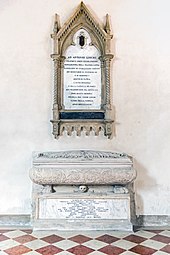Antonio Loschi
Antonio Loschi , Latinized Antonius Luschus , (* 1365 or 1368 in Vicenza ; † 1441 ibid) was an Italian humanist , poet, philologist and historian . He is considered one of the most important humanists of his generation.
Antonio Loschi was the son of the notary Ludovico di Niccolò. This was in the service of Antonio della Scala . He studied from 1386 at the University of Florence with Coluccio Salutati and two years later went to the University of Pavia , where he studied grammar and rhetoric with Giovanni Travesi . Gasparino Barzizza was probably one of his fellow students. After completing his studies in 1391, he entered the service of Gian Galeazzo Visconti , the ruler of Milan . One of his main tasks was to campaign for this propaganda, which he also did in letters, poetry and invectives . He also made a name for himself as a speaker, philologist and poet of other works. He was in correspondence with many important humanists of his time, including Coluccio Salutati, Leonardo Bruni , Gian Francesco Poggio Bracciolini , Flavio Biondo , Francesco Barbaro and Francesco Filelfo . Bruni dedicated two of his writings to Loschi. In 1397 he published Invectiva in Florentinos . In writing, he accused Florence of opposing the interests of the Florentine people with their resistance to the power of his master Gian Galeazzo Visconti. The writing clouded the relationship with Coluccio Salutati and Cino Rinuccini , who responded with counter-writings to Loschi's work. From Venice he was with embassies to the Popes Innocent VII and Gregory XII. entrusted. In 1409 he became apostolic secretary in Rome and remained in this position until 1436. His tomb is in the Cattedrale di Santa Maria Annunciata in Vicenza.
As a philologist, Loschi dealt primarily with the Roman rhetoricians. He translates Quintilian's Declamationes into Volgare , and commented on the handwritten Cicero speeches that he had received. The commentary from 1395 was printed in 1477 under the title Inquisitio in Venice. Loschi combined the explanation of the speeches with systematic explanations of the rhetoric, which he derived from the ancient texts on the rhetoric of Quintilian and Cicero and thus ultimately created a kind of manual of ancient rhetoric. Following the example of Quintilian, he wrote his own rhetorical text, Declamationes controversiales . In 1390 he wrote a tragedy of verse with Achilles .
Fonts
- Inquisitio super XI orationes Ciceronis, ad fratrem suum optimum. Venice 1477.
- Carmina quae supersunt fere omnia. Edited by G. Da Schio. Padua 1858.
- Prosatori latini del Quattrocento. Edited by E. Garin. Milan / Naples 1952.
- Lirici toscani del Quattrocento II. Ed. By A. Lanza. Rome 1975.
- Achilles. Ravenna 1981.
literature
- Luigi Pastine: Antonio Loschi umanista vicentino. In: Rivista d'Italia. Volume 18, 1915, pp. 831-879.
- Mario Emilio Cosenza: Biographical and bibliographical Dictionary of the Italian humanists and of the world of classical scholarship in Italy (1300–1800). Boston 1962, pp. 2030-2033.
- Paolo Viti: Loschi, Antonio. In: Mario Caravale (ed.): Dizionario Biografico degli Italiani (DBI). Volume 66: Lorenzetto – Macchetti. Istituto della Enciclopedia Italiana, Rome 2006.
- Germano Gualdo: Antonio Loschi segretario apostolico (1406–1436). In: Archivio Storico Italiano . Volume 147, 1989, pp. 749-769.
- Dorothee Gall : Loschi, Antonio. In: Peter Kuhlmann , Helmuth Schneider (Hrsg.): History of the ancient sciences. Biographical Lexicon (= The New Pauly . Supplements. Volume 6). Metzler, Stuttgart / Weimar 2012, ISBN 978-3-476-02033-8 , column 757 f.
supporting documents
| personal data | |
|---|---|
| SURNAME | Loschi, Antonio |
| ALTERNATIVE NAMES | Luschus, Antonius (Latinized name); Luschis, Antionio de |
| BRIEF DESCRIPTION | Italian humanist, philologist, poet and historian |
| DATE OF BIRTH | 1365 or 1368 |
| PLACE OF BIRTH | Vicenza |
| DATE OF DEATH | 1441 |
| Place of death | Vicenza |
